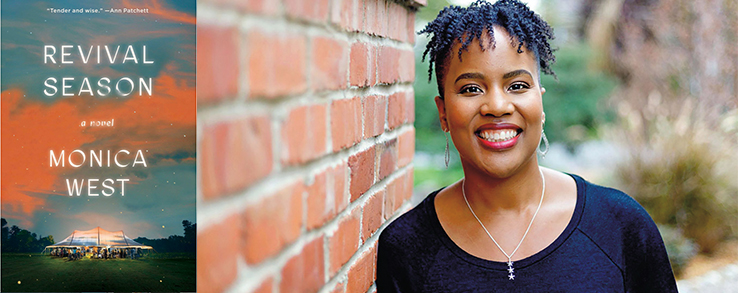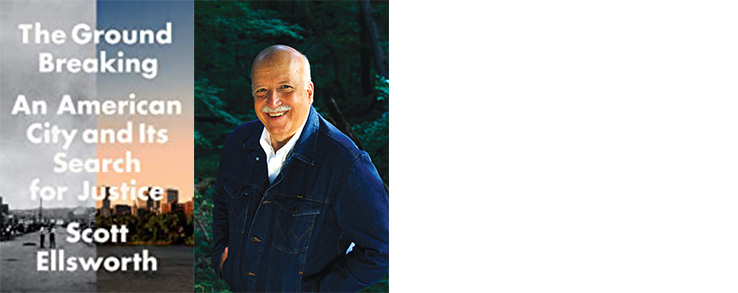We asked Monica West ’99 about Revival Season (Simon & Schuster), a coming-of-age story about the daughter of an evangelical preacher who each year takes his family on the road to heal souls and bodies.

On her not-straight-path to becoming a novelist
I’ve written stories since I was nine, and somehow, it always felt like, and honestly it was treated like, a hobby. It was a thing that I loved doing but people were always saying, “Okay, well, when you go get this real job, you can always just do this thing you like on the side.” The first legit class I took in writing was at Duke. I took a fiction-writing class with Elizabeth Cox; I think it was my senior year. And I thought, “Where has this been all my life?” I took Ms. Cox’s class and one with Christina Askounis, who did a nonfiction class the spring of my senior year. Both classes were really, really lovely and kind of transformative for me as a writer. I kept doing it, toiling away on my own. But I was really practical about, “Okay, how can I make money?” and just went that way. I left Duke and went to Teach For America in Phoenix. I did that, and then I went to New York University for grad school. I kind of started writing [another, unpublished novel] back in 2000—gosh, 2001—for nine, ten years, I worked on that. I got in writing groups and writing programs in New York, and that was when I actually started getting my feet wet a little bit in a writer’s life. I did workshops and then I worked on a novel and then went to writing programs in the summer for the first time. But it still felt like a hobby. I finished the first book, tried to get it out in the world. I wasn’t really diligent with it. I did a little bit of querying, but not a ton. I worked in publishing for a while and then started Revival Season in 2012. I went right away to a writing program that summer, and my first writing instructor said to me, “You should really think about an M.F.A.”
I got into the Iowa Writers’ Workshop in 2015. And then once I went to Iowa, it was like officially, “Okay, I can do this, I think. People believe in me to do this.”
And so, it’s been this long, winding path to getting where I am, but it’s basically been people whispering into my ear. But I’ve never stopped writing.
On finding the plot of her novel
I don’t sit down and say, “I’m going to write a novel about blank.”
I finished my first book, and thought, “I don’t know what I’m going to write next. Is there another book in there?” I hadn’t really thought about something else. And then this picture of the van comes to my brain. I thought, “Huh, what’s that?” I ignored it, but I kept seeing it, and so I said, “Okay, so what’s happening here?”
I kept seeing it. Anytime when I was not in the midst of something else. Anytime I was still and quiet, that image would come back to me.
And so, I saw the van, and then I said, “Okay, so there’s a van here, and what is it, and what’s happening in it, and what’s the story here?” And that’s when I thought about, “Okay, what matters? What do I think would be interesting to write about?” That’s when the idea of a power dynamic came and the idea of the van becoming a space, not just transportation, but a home in some ways, especially for this family. And what it would feel like for a person with all the power in the world to be sitting right next to a person who had none of it? Once I found the power dynamic, that’s when I played out the idea of “Why are they traveling? Where are they going?” That’s when I thought about the idea of what would happen if they were a religious family and they’re in this van because that’s part of their job.
I’ve always been fascinated by the dynamics of religion, and how power works, and how power is passed through lines of gender. I was thinking in terms of how power works in this family where the person that they look up to is also the father, who is flawed; he’s their spiritual leader in some ways and the spiritual leader for a lot of other people. What does it mean for him to not just to be the dad, but to be this kind of stand-in for God?
It’s something that I always struggled with, even when we went to church. I was born and raised Baptist but not in the South. We went to church on Sundays. And even when I was younger and growing up, I always struggled with who gets to be seen.
I’d see men doing this, and men doing this, and men doing this. And I always just wondered, why aren’t there women? Why do I not see that mirrored back in some ways, and how are men kind of taking the reins of that power and then using the Bible to justify it? I had to ramp it all the way up for this book because it couldn’t be just a girl who goes to church on Sundays and has this struggle. It had to be someone who…this is their family’s life work. This is their blood. This is their bread and butter. This is what they fully, fully believe and have dedicated their lives to.
On finally publishing a book
I never dared to call myself a writer. A writer publishes books. So, to then sell a book with a Big Five publisher, to have a dream that I’ve had for years—for over thirty years—come to fruition, is so validating. To have a book in the world is terrifying; exciting and terrifying. And anxiety-provoking. And yet, what I have to always bring myself back to is this is exactly what I wanted, and this is just a realization of a dream. I have lovely, lovely parents. My dad never understood when I quit my full-time job to go to Iowa to get my M.F.A. I already had an M.A. I said, “Dad, I’ve got to give this a chance. This is the one thing that has been my constant.” When I finally sold my book, I said, “Dad, this is why I’ve been doing this. I finally did this thing that I’ve been trying to do for years.” So, to have the dream then happen feels so, so, so, so good.
RECOMMENDATIONS from Scott Ellsworth A.M. ’77, Ph.D. ’82

In The Ground Breaking: An American City and Its Search for Justice (Dutton), Ellsworth digs into how the 1921 race massacre that happened in his hometown, Tulsa, Oklahoma, was brought to light. Here, he shares the works that influenced his writing.
The Nation Must Awake: My Witness to the Tulsa Race Massacre of 1921 by Mary E. Jones Parrish, foreword by John Hope Franklin
There is no more important source on the history of the tragedy in Tulsa than this slim volume, written by a pioneering African-American journalist who survived the massacre by fleeing down the streets of Greenwood in a hail of bullets. Privately published in 1923, with fewer than 100 copies printed, Parrish’s book is now widely available for the first time.
The Immortal Life of Henrietta Lacks by Rebecca Skloot
What a gem of a book! Not only did Skloot help to bring out into the open one of the most important medical revolutions of the past seventy-five years, but she did so with precision, clarity, and empathy. Her book was also important to me as a guide to how an author who is a part of the story can, for the most part, stay out of it.
Say Nothing: A True Story of Murder and Memory in Northern Ireland by Patrick Radden Keefe
A masterful account of “the Troubles” in Northern Ireland, and the murder of a Belfast woman, Radden Keefe’s book touches upon many of the themes in my work. Not only is it beautifully researched and composed, but the author does an incredible job of re-creating the tone and atmosphere of a divided land.
Death in a Promised Land: The Tulsa Race Riot of 1921 by Scott Ellsworth
Written when I was a graduate student at Duke, this was the first comprehensive history of the massacre. It helped to crack open the door to a fuller understanding as to Tulsa’s hidden disaster, and for a while it was the most stolen book out of the city’s library system. First published in 1982, it’s now been in print for thirty-nine years.
By DUKE ALUMNI & FACULTY
Black Girls Must Die Exhausted
Jayne Allen aka Jaunique Sealey B.S.E.E. ’00
(HarperCollins)
Tabitha Walker is on track for “having it all” when an unexpected diagnosis jeopardizes her ability to have children.
Disrupting Whiteness: Talking With White People About Racism
Darrell “Drick” Boyd ’75
(Arch Street Press)
Drawing on his personal experience as a professor and anti-racism trainer, Boyd offers a conversational—rather than combative— approach to talking about racism.
Something Happened in our Park: Standing Together After Gun Violence
Marianne Celano ’79, Ann Hazzard & Marietta Collins
(Magination Press)
When Miles’ cousin is injured in a shooting, he realizes people can work together to reduce the likelihood of violence in their community.
The Job Closer: Time-Saving Techniques for Acing Résumés, Interviews, Negotiations, and More
Steve Dalton, senior career consultant and associate director, Fuqua School
(Ten Speed Press)
A guide to time-saving techniques to land your dream job, from the interview to the negotiation.
Shooting Cameras for Peace/Disparando Cámaras para la Paz: Youth, Photography, and the Colombian Armed Conflict
Alexander L. Fattal ’01
(Peabody Museum Press)
Fattal’s text accompanies photography from a media project he founded that taught photography to young people in Bogota.
Whence These Special Places? The Geology of Cashiers, Highlands & Panthertown Valley
William S. Jacobs J.D. ’71
(Great Rocks Press)
Part guide, part illustrated explanation of the geology of the Highlands-Cashiers Plateau of western North Carolina.
Off Our Chests: A Candid Tour Through the World of Cancer
John Marshall ’83 and Liza Marshall ’84
(Ideapress Publishing)
Oncologist John was outspoken in his resentment of the dominance of breast cancer advocacy and research. Then his wife, Liza, was diagnosed with a high-risk breast cancer.
Not Little
Maya Myers ’96; Illustrated by Hyewon Yum
(Neal Porter Books/Holiday House)
When diminutive Dot stands up to a bully on behalf of an even smaller friend, she proves how big she can truly be.
Stupid Things I Won’t Do When I Get Old
Steven Petrow ’78
(Kensington)
Soon after his fiftieth birthday, Petrow began assembling a list of all the things he thought his then-something-year-old parents were doing wrong.
Unique Eats and Eateries of Atlanta: Stories of People Who Make the Food We Love to Eat
Amanda Plumb ’99
(Reedy Press)
The stories behind more than eighty restaurants and grocers that make up the city’s Southern and global culinary scene.
A Home on Wilder Shores
Susan P. Posey ’68
(Great Rocks Press)
This novel follows two Welsh sisters in the 1750s who leave colonial Philadelphia for the North Carolina frontier in search of their mother.
Angels We Have Heard Are High
Charles Schuster M.Div. ’69
(Wipf & Stock)
Stories that invite the reader to use Christmas as a pathway to find the sacred in everyday life.
100 Days in Vietnam
Joseph F. Tallon with Matt Tallon ’01
(Koehler Books)
A father and son memoir chronicling the father’s time in Vietnam and his quest to secure a Purple Heart for a fallen comrade.
Share your comments
Have an account?
Sign in to commentNo Account?
Email the editor